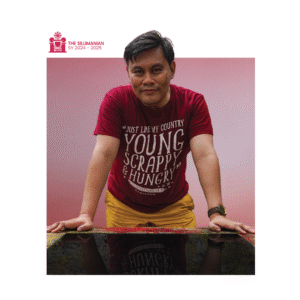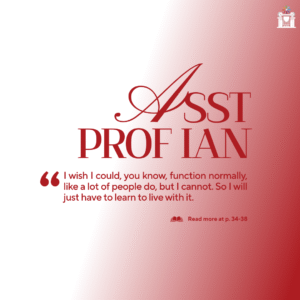

Words by: Genno Gabriel Rabaya
Multi-awardee Ian Casocot divulges how his diagnosis shaped him and his writing
“I wish I could, you know, function normally, like a lot of people do, but I cannot. So I will just have to learn to live with it.”
An established and multi-awarded writer, Ian Rosales Casocot has spent his years curating a successful career in the literary arts. As a five-time recipient of the Don Carlos Palanca Memorial Awards for Literature and an NVM Gonzalez Prize for his fictional works, Ian’s familiarity with a pen is evident in his achievements. One thing’s for certain: he plays a pioneering role in solidifying Dumaguete as a pillar of the national literary scene.
Yet even with a reputation like his, Ian always had his fair share of struggles and personal tolls that delayed him from accomplishing his goals. In particular, this takes the form of his neurodivergence.
Strangely enough, this is a hurdle that he carries with pride, especially through his writing.
At a young age, Ian took an early interest in shaping narratives. As a mass communication graduate and a master’s degree holder of creative writing, he honed his capabilities by immersing in various forms of writing—from academic to journalism to fiction.
“I think writing is something that’s both trainable and also innate,” he says.
His devotion to writing began with his teachers who pushed him to explore the field, which led him to earn positions, such as the editor-in-chief for both the Weekly Sillimanian and the Sillimanian Magazine. Eventually, he further pursued his passion by sharing the craft with others.
Beyond his feat as a creative writing teacher for 25 years, he also made a name for himself through his published literary works. With books like Beautiful Accidents: Stories and Inday Goes About Her Day, among many others, Ian garnered several awards to his roster.
On top of these, he writes for the local newspaper Metropost regularly. A prominent topic he consistently shares about is his journey dealing with his mental health.
“I know that many people who listen to me know that I have a platform. I know that people read me. So I decided that I will be open about this,” he says.
Ian admits that his journey with neurodivergence has been a tough one. In any discourse relating to mental health, he considered himself to be an outsider but, unbeknown to him, his attention deficit hyperactivity disorder (ADHD) has always been there. He put an emphasis on his work as a writer and teacher without realizing the toll it took on his mental health.
“I just thought it was because of my personality. For example, my brain not being able to understand dates,” he shares.
Ian entered a period where he felt vulnerable, but he saw himself as a strong person, capable of doing anything he put his mind to—this feeling was indeed unfamiliar to him.
This plagued his mind throughout the pandemic. Ian knew he needed a helping hand yet he refused. At the insistence of his partner, he sought therapy and was diagnosed with adult ADHD.
“I would berate myself for exhibiting these things, thinking that it stemmed from some personal frailty or like I’m just being lazy. I learned to forgive myself after my diagnosis because I know now what ADHD is like.”
Ian rediscovered himself amid all the mental trials. He has learned not to repress his condition and instead figured out how to get around it: tricks, he would call them. The mere manner of seeking help—something he had never done before—was a trick he learned to embrace.
He acknowledges that it has not been a smooth transition to get to where he is now. Even with day-to-day tasks, he struggles to navigate through his ADHD. However, he doesn’t see this as a roadblock, rather he considers this as his superpower.
In this advent of personal rediscovery, Ian wears his neurodivergence on his sleeve. Openly using his mental struggles as inspirations for writing, he has published several works on the topic of neurodivergence. His dedication to writing on his neurodivergence is his way of breaking free from the stigma and helping people who may be going through the same things he went through.
The stigma around neurodivergence is prevalent, as Ian firmly expresses. With a lot of people telling him to “snap out of it,” it is important to have a support system that makes you feel seen and heard.
“In my case, I’ve been lucky that I have people who are neurotypical but are not dismissive, who listen to me, who are supportive of me and they accommodate me because of this,” he explains.
As he returned to his work, he reclaimed his narrative amid all of his experiences. Although Ian still catches himself wishing he was neurotypical, embracing his full self with his superpower and figuring out his tricks have helped him find comfort through it all.
Ian fully understands the struggle it takes for one to figure out their mental health journey, encouraging them to also find courage in seeking help. For Ian, he is not free from his neurodivergence, only he has learned to accept himself with it.
“The best thing about being diagnosed is your ability to forgive yourself,” he reflects.
